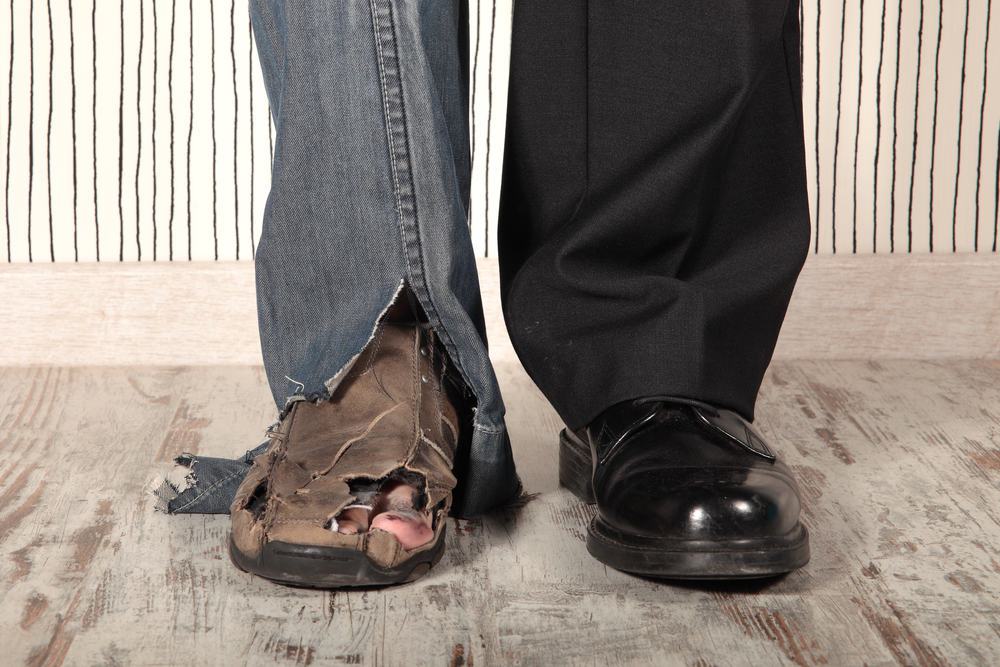While living in a dorm room this summer at a university in Ireland, I was reminded about one aspect of human nature I really dislike. I had to get to another campus to give a speech, and went downstairs to the reception desk to ask someone to please call me a taxi. However, the person behind the desk really didn’t seem interested, and appeared put out by my request even after I clearly explained that I didn’t have a phone to make the call myself. She asked me to hold on, and while I waited patiently, she was keen to help other adults with friendliness, warmth, and her time. And I became a bit frustrated because there are signs everywhere around my dorm about how the staff are available to help with anything I might need.
When these sorts of things happen, my mind instinctively starts to churn with certain thoughts to reconcile the situation. Maybe the receptionist wasn’t comfortable with my American accent, and maybe she prefers chatting and helping those with Irish accents. Maybe she wasn’t eager to help because I was dressed down – in very casual clothes – and because I may appear to her to be a student instead of a professor. Of course, that shouldn’t matter, but maybe it did. When she finally turned again my direction, she shrugged her shoulders and gave me a pat answer. I thanked her anyway, and said that I would attempt to request a taxi through the cab company’s website from my room.
And so I tried that, but had no luck at all. Remembering, though, that God always responds even when no one else will, I just got ready for my speech by showering, shaving, and putting on my formal clothes, and then headed back downstairs with the hope that someone else would be at the reception desk to assist me. Unfortunately, it was the same woman, but this time she was quite eager to lend a hand. The only difference, based on what I could tell, was my appearance. I was suited and booted, fresh-faced, and professional-looking. And with a newfound enthusiasm to come through for me, she helped me get a taxi.
I cannot express to you how maddening this is. It’s happened a handful of times to me, and I’m sure it’s happened to you. We live in a world where appearances matter. We’ve been taught this from an early age: the importance of first impressions during interviews, first dates, and other special events. Perhaps it’s related to the halo effect – the cognitive bias we all have where an initial impression we have of someone affects our overall thoughts and feelings we have about their character and value.
We’ve been taught this from an early age: the importance of first impressions during interviews, first dates, and other special events.
Also, it is perhaps second nature for us to judge others and group them in pre-established categories so that we know how to reflexively respond to them – based on our prior experiences with (or perceptions of) others in that category. We do this out of convenience, and for the sake of efficiency. Nevertheless, it drives me bonkers because I think it’s flat out wrong. I’m all about truth and justice, and something about it feels unjust. It feels…shallow, callous, disingenuous, and even manipulative.
What is our root motivation for judging based on appearances? From my perspective, I think it shamefully betrays that many of our new interactions are transactional. We enter them subconsciously looking to get something out of them. We are hoping, at least in part, that there might be some sort of symbolic or substantive personal gain from it. With some self-reflection, maybe we would honestly even admit that to ourselves.
When I have someone coming to our house to fix an appliance or perform a service job, I seriously take the time to put on pants and a button down so I look more like a professional and less like a kid.
Allow me to share something you may think silly and even pretentious. When I have someone coming to our house to fix an appliance or perform a service job, I seriously take the time to put on pants and a button down so I look more like a professional and less like a kid. This is because I am convinced I will be thought of less highly if I’m in a t-shirt and shorts, and that will consequently affect the quality of the service I receive. Is that crazy? Perhaps.
I do this when I go to the repair shop to get my car fixed too. And when I go to see a new doctor or health care provider. I guess I believe that I need to look a particular way in order to increase the odds that I will be treated better than the norm. It’s disappointing to me that I do this because it is transactional and contrived and insincere, and because these actions reflect a broken human condition of which I am a representative. This is my reality.
On the flip side, I honestly try to treat everyone exactly the same, regardless of how they look or dress. Really. I am actually obsessive about this. I believe that if you asked anyone who knows me, they would agree that I give my best to the person who is in front of me no matter who they are. I know I do this because I’m keenly aware of latent prejudices and biases that can often manifest in these contexts.
But I also do it because of my faith. And because the life lessons I have learned through God’s Word have proven themselves infallible to me.
Jesus gave his best to the person right in front of Him every time. Without exception. It’s a defining trait, and one I find so admirable. I want to be like this, always. He blessed and healed those with wealth, and those without. He reached out to those the world considered beautiful and whole, and those the world considered physically ugly and diseased. He came to the rescue of the young and the old. He bestowed goodness, warmth, and sincere affection with unrivaled impartiality.
Why did He do this? I think it’s because He saw everyone with spiritual eyes and a heavenly perspective, and knew that every single one of them was made in the image of God. And, therefore, each person had inherent value.
He reached out to those the world considered beautiful and whole, and those the world considered physically ugly and diseased. He came to the rescue of the young and the old. He bestowed goodness, warmth, and sincere affection with unrivaled impartiality.
James – a brother of Jesus – penned the most damning words related to the classism we sometimes display in our actions: “Suppose a man comes into your meeting wearing a gold ring and fine clothes, and a poor man in filthy old clothes also comes in. If you show special attention to the man wearing fine clothes and say, “Here’s a good seat for you,” but say to the poor man, “You stand there” or “Sit on the floor by my feet,” have you not discriminated among yourselves and become judges with evil thoughts?”
We unequivocally need to treat everyone the same, regardless of what they look like. And since I am downright troubled by what I see and experience to the contrary, I can do two things.
First, I can consistently represent a standard of interacting with others that is noble and above reproach, and point to unyielding truths that champion the best ways to interact with others. I hope that my life serves as a model that others strive to emulate, and conveys that I am simply trying to emulate Jesus – who did it perfectly and who can actually equip us to follow in His footsteps. We totally cannot do it ourselves, in our own strength and self-discipline.
Second, I can ask Him to open the eyes of my heart to see everyone’s needs and hopes with His perspective, and thereby increase my sensitivity to “the least of these.” If I am known for anything in this world, I want to be known for this. Not so that I can be commended and praised, but simply because every single person matters. And my actions fully need to reflect that fact, every single time.
Image source:
http://bzfd.it/2tXWsVn





Leave A Comment